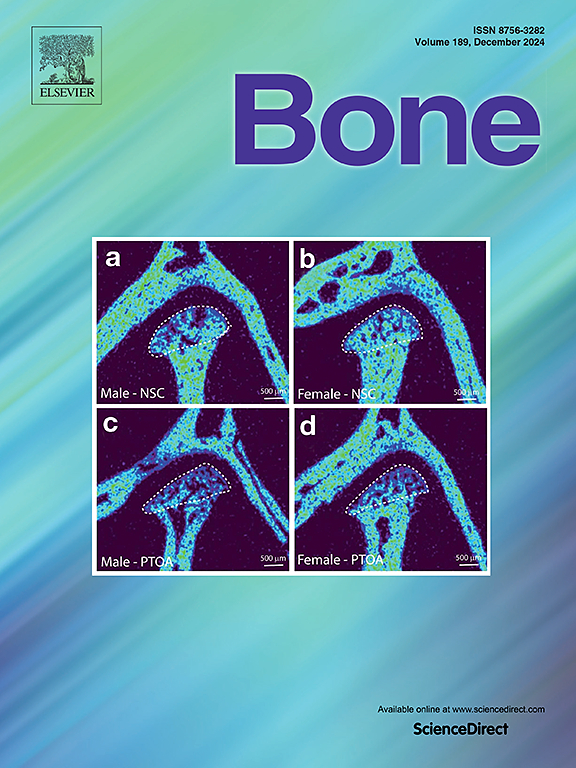肥胖和胰岛素缺乏型2型糖尿病对小鼠骨骼表型、骨髓脂肪组织和血清抗菌肽水平的差异影响
IF 3.5
2区 医学
Q2 ENDOCRINOLOGY & METABOLISM
引用次数: 0
摘要
肥胖是发生2型糖尿病(T2D)和代谢并发症的危险因素,通过全身性炎症和胰岛素抵抗。它还与骨髓脂肪细胞增加以及骨骼脆性和骨折风险增加有关。然而,肥胖和T2D对骨骼脆性的不同影响尚不清楚。抗菌肽相关抗菌肽(CRAMP)是先天免疫的多功能调节剂,已成为心脏代谢疾病的生物标志物。本研究的目的是1)评估高胰岛素血症型肥胖与胰岛素缺乏型T2D对骨骼表型和骨髓脂肪组织(BMAT)的差异影响,以及2)分析肥胖和T2D背景下与抽筋表达及其循环水平的联系。我们采用C57BL/6 J雄性小鼠高脂饮食(HFD)诱导的肥胖模型,以及链脲佐菌素(STZ)联合HFD诱导的胰岛素缺乏型T2D模型,反映了两种疾病的代谢异质性。与低脂饮食(LFD)对照组相比,喂食16 周后,HFD小鼠表现出明显的体重增加,中度高血糖,糖耐量和胰岛素敏感性受损,血清胰岛素水平显著升高。这种高胰岛素性肥胖导致胫骨小梁(Tb.Th)和皮质厚度(Ct.Th)减少,除了皮下(SCAT)和内脏脂肪组织(VAT)增加外,还伴有显著的BMAT扩张。在循环中没有观察到痉挛肽水平的变化,也没有观察到其他骨骼参数的变化。而HFD/STZ组的高血糖、葡萄糖耐受不良、胰岛素抵抗和低胰岛素血症更为严重。我们还观察到,与HFD组相比,SCAT和VAT的扩张受到负面影响,BMAT的增长也较低。然而,这些胰岛素缺乏T2D的小鼠表现出胫骨近端小梁数量(Tb.N)的早期减少,从8到16 周逐渐减少,并且股骨生物力学刚度受损。这些改变还伴随着HFD/STZ小鼠循环中抽筋肽水平的降低。HFD组和HFD/STZ组VAT中CRAMP mRNA水平均降低。总的来说,这些结果为肥胖和T2D对骨微环境的不同负面影响提供了新的见解,并表明胰岛素缺乏期间高血糖诱导的骨质量改变与先天免疫的抗菌肽调节受损之间存在联系。需要进一步的研究来阐明这种关系。本文章由计算机程序翻译,如有差异,请以英文原文为准。
Obesity and insulinopenic type 2 diabetes differentially impact, bone phenotype, bone marrow adipose tissue, and serum levels of the cathelicidin-related antimicrobial peptide in mice
Obesity is a risk factor of developing type 2 diabetes (T2D) and metabolic complications, through systemic inflammation and insulin resistance. It has also been associated with increased bone marrow adipocytes along with increased bone fragility and fracture risk. However, the differential effects of obesity and T2D on bone fragility remain unclear. The cathelicidin-related antimicrobial peptide (CRAMP) is a multifunctional modulator of the innate immunity that has emerged as biomarker of cardiometabolic diseases. The aims of this study were i) to assess the differential impact between hyperinsulinemic obesity versus insulinopenic T2D, on bone phenotype and bone marrow adipose tissue (BMAT), and ii) to analyse the link with CRAMP expression and its circulating levels in the context of obesity and T2D. We used C57BL/6 J male mice models of obesity induced by high-fat diet (HFD), and of insulinopenic T2D induced by streptozotocin (STZ) treatment combined with HFD, reflecting the metabolic heterogeneity of the diseases. As compared to low-fat diet (LFD) control group after 16 weeks of feeding, the HFD mice exhibit a significant weight gain, moderate hyperglycaemia, impaired glucose tolerance and insulin sensitivity, and significant increase in serum insulin levels. This hyperinsulinemic obesity led to decreased trabecular (Tb.Th) and cortical thickness (Ct.Th) in the tibia, associated with significant BMAT expansion, in addition to increased subcutaneaous (SCAT) and visceral adipose tissue (VAT). No changes were observed in the circulating levels of CRAMP peptide neither in other bone parameters. While, STZ treatment in HFD/STZ group induced a more severe hyperglycaemia, glucose intolerance and insulin resistance, and hypoinsulinemia. We also observed a negative effect on the expansion of both SCAT and VAT, as well as lower increase in BMAT as compared to HFD group. However, these mice with insulinopenic T2D exhibit early decrease in trabecular number (Tb.N) in proximal tibia, progressively from 8 to 16 weeks of protocol, and impaired femoral biomechanical stiffness. These alterations are also accompanied with decreased circulating levels of the CRAMP peptide in the HFD/STZ mice. The CRAMP mRNA levels decreased in VAT of both HFD and HFD/STZ groups.
Overall, these results provide novel insights into the differential negative impact of obesity versus T2D on bone microenvironment, and suggest a link between hyperglycaemia-induced bone quality alterations during insulinopenia, and impaired regulation of the cathelicidin peptide of the innate immunity. Further investigations are needed to elucidate this relationship.
求助全文
通过发布文献求助,成功后即可免费获取论文全文。
去求助
来源期刊

Bone
医学-内分泌学与代谢
CiteScore
8.90
自引率
4.90%
发文量
264
审稿时长
30 days
期刊介绍:
BONE is an interdisciplinary forum for the rapid publication of original articles and reviews on basic, translational, and clinical aspects of bone and mineral metabolism. The Journal also encourages submissions related to interactions of bone with other organ systems, including cartilage, endocrine, muscle, fat, neural, vascular, gastrointestinal, hematopoietic, and immune systems. Particular attention is placed on the application of experimental studies to clinical practice.
 求助内容:
求助内容: 应助结果提醒方式:
应助结果提醒方式:


